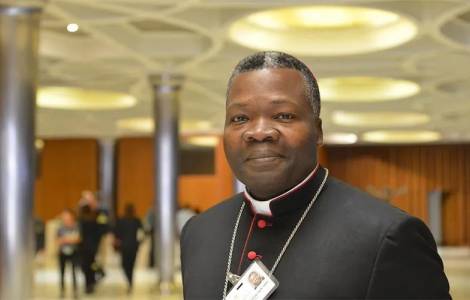
Vatican Media
Brazzaville (Agenzia Fides) - "We are poor people living in a rich country," says the President of the Episcopal Conference of the Republic of Congo and Archbishop of Brazzaville, Bienvenu Manamika Bafouakouahou, in an interview with Fides.
What is the situation of the Church in the Republic of Congo?
I can say that the situation is stable, but stability does not mean that everything is good. There are so-called "revival churches" or Pentecostal communities that wage a kind of "guerrilla warfare" on spiritual terrain, in the sense that they bitterly fight the Catholic Church. They disrupt the faith of Catholics by offering quick and easy solutions to their problems. While we are in the truth, and that is what I actually believe, this truth is difficult for Christians who live in poverty to accept because they seek direct, immediate solutions to their pressing problems. They then find “magical solutions” with these pastors, even if they still remain in poverty. But in general the Catholic Church continues on its path.
Do these “revival churches” originally come from the Congo or do they come from outside?
Currently, there are "local branches" of realities that come from neighboring countries but are led by pastors trained in the United States. In fact, these realities are supported by American Pentecostal churches. On November 13, the Dicastery for the Doctrine of the Faith confirmed the ban on Catholics joining Freemasonry.
Are Congolese elites attracted to it?
I believe that the local elites in Central Africa are not escaping Freemasonry. To climb the social ladder, one must join Freemasonry. The Church strongly discourages it because it is like a "magical" path to success. However, even if a person has the intellectual ability to obtain a position of responsibility, he cannot get it unless he joins Freemasonry. Freemasonry no longer hides itself as it once did. Many young people today are recruited into it. The Church resists this because for us it is an esoteric mechanism that is not objective and does not help society. We are always in dialogue with our intellectuals who may be attracted to the Masonic paths. But we tell them that this is not the path they should follow. The only path one should follow is the regular path, not the shortcut path. But the problem is this: When a young Christian has completed his studies and is looking for a job, he resists this pressure at first, but then he realizes that he has a family to support. And when he applies for a public position, he is asked to join Freemasonry to get it. This becomes a dilemma for him. What should he do? And as a pastor, I have to tell him: stick to your convictions. But who feeds him and his family? This is a real pastoral problem, as bishops we are challenged by this situation.
What can the Church do?
First, the church does not change its way of proclaiming the gospel. The Church guards the truth and shapes consciences. It is up to people to make choices regarding their beliefs. We cannot force the path, but we show it. If you choose another path, it is a shame, but if you choose the path of faith, it is a joy for the church and we try to strengthen faith through educational opportunities. That is why we founded “Accabe, the Academy of Ethics in Brazzaville, to help Catholic students, intellectuals and parliamentarians to pursue a consistent course. Unfortunately, poverty doesn't help us. Some say to us: "Monsignor, I would like to behave well, but what does my family eat?" So we live in a “hybrid” context.
The problem of human development is therefore posed. But how can it be reconciled with environmental protection?
The Republic of Congo is one of the three equatorial forest basins, which, in addition to ours, also include the Amazon and Borneo basins in Southeast Asia. In mid-October, our country hosted a Three Basin Summit. From the President of the Republic to ordinary citizens, all Congolese are very committed to protecting the environment. All of this is true, but we are still in theory. When the Pope complains in his letter “Laudate Deum” that there is a lot of theory at the various climate summits, he does so because the situation on the ground is contradictory. For example, the big mining companies promise development, building schools, etc., but that doesn't happen. In Pointe-Noire, they promised schools and development, but we see that entire villages are polluted and that tends to lead to misery. What the Pope says is true and I hope his voice will be heard at the next COP. There is a lot of talk about environmentally friendly development, but on the ground the big decision makers do what they want. Our countries, so rich in natural resources, are not included in the group of decision makers who have a say over our oil, timber, etc. And the money is also mismanaged. So we seem to be making progress, but in reality that's not the case. At the end of the day, we are poor people living in rich countries. (L.M.) (Agenzia Fides, 20/11/2023)
 ASIA/VIETNAM - Vietnamese Catholic communities stand alongside women in need to combat mass abortion
ASIA/VIETNAM - Vietnamese Catholic communities stand alongside women in need to combat mass abortion